Time to Change, the mental health anti-stigma campaign run by Mind and Rethink Mental Illness, recently found that people are becoming less likely to discriminate against those with mental health problems.
Their findings included a 7% increase in people saying they'd be willing to work with someone experiencing those issues.
We spoke to five people who have experienced mental health problems about why they have, or haven't, chosen to speak out about it at work.
1.
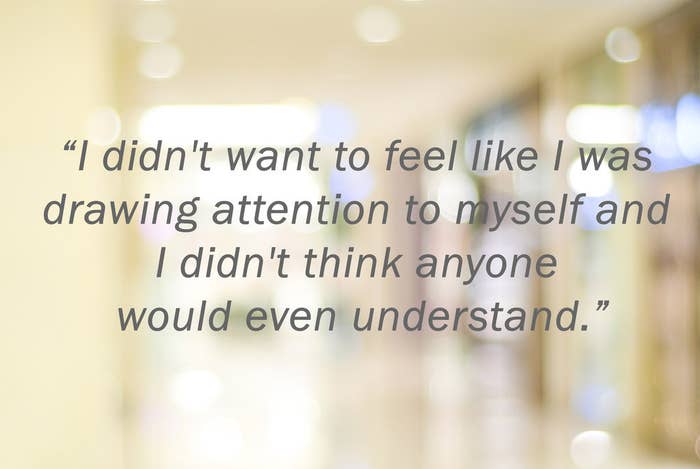
I have a long history of suicide in my family, and at one previous job I found a lot of conversations really triggering and insensitive.
When Robin Williams died, everyone in my workplace kept discussing it in great detail, asking: "Why would he do that? Wasn't he happy? I wonder if it hurt?"
I remember feeling so hurt by the whole conversation, but I didn't want to say anything because I felt like I'd be making a scene. I didn't want to feel like I was drawing attention to myself and I didn't think anyone would even understand.
I just sat in my chair secretly begging for the conversation to stop. I feel like I'm in a safe space now, but I hope people who feel like they aren't know that they have every right to feel hurt by certain conversations. – Anonymous
2.
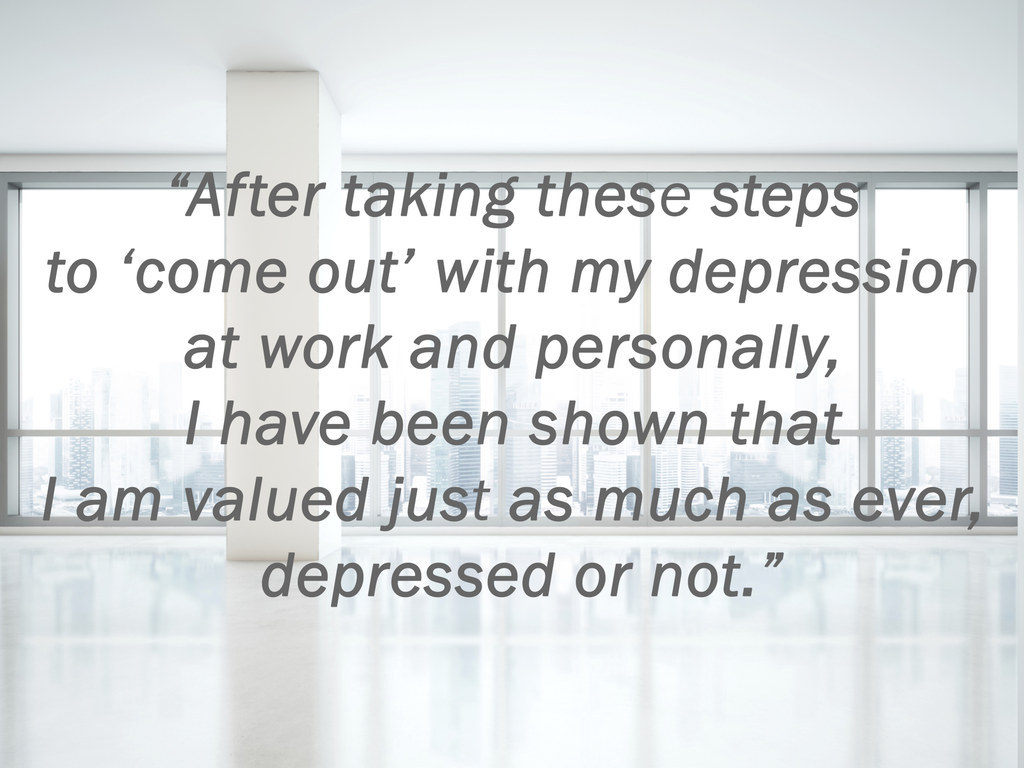
I've suffered periods of depression since my teens, perhaps even before that.
I'm now a management consultant and a lot of my work is complicated, intense, and at times requires long hours. At a previous employer, during a long and stressful project where I led two teams, one of my managers appeared shocked and concerned when I shared that I was struggling and needed to go home for the afternoon.
She offered few words of support when I told her and the next day said she felt that it was better that I left the project when my assigned time was up. I felt shamed by my depression and stress. "You are not good enough," I told myself, and "You need to conceal your illness or others won't respect you. You'll never get promoted if people know."
The following year, in a new position as a management consultant with KPMG, I, like everyone, had to have an occupational health discussion because of my (honest) disclosure to my performance manager and HR that I had previously suffered with episodic situational depression.
Unfortunately last summer I became very ill with depression and had to have a few weeks off work and a spell in hospital to treat this. I was terrified of losing my job and told only the people I absolutely had to according to KPMG's policy on sickness and absence. Later in the year, while recovering, I realised that I couldn't begin to accept myself as I am while still hiding my depression, and decided to blog and tweet about it, as well as becoming a media volunteer for charities Mind and Time to Change.
After taking these steps to "come out" with my depression at work and personally, I have been fully supported by KPMG, who have shown that I am valued just as much as ever, depressed or not.
I've also become active in working with colleagues to banish fears around being honest about one's mental health at work. I'm excited to be part of that process. I've received dozens of emails from colleagues supporting me and sharing their own stories of mental health experiences, and I'm determined to carry on doing my bit so my colleagues feel that they can be honest about their mental health, and hopefully happier and healthier for speaking out. – Jessica Carmody, management consultant
3.
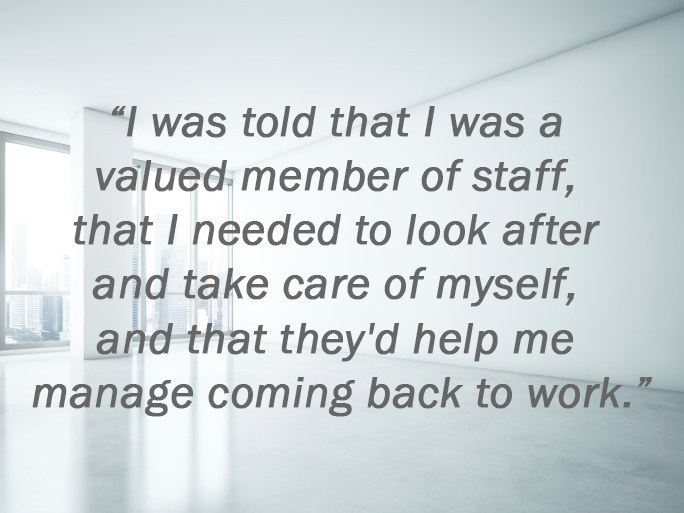
I suffered two severe episodes of anxiety and depression earlier on in my working career – both of which built up very slowly but ultimately required me taking a period of time off work to recover.
At first I wasn't open about my anxiety and depression with my colleagues, and this is something I really regret. When it happened the first time round, I was really worried that giving my work any indication that something was wrong would be seen as some kind of weakness. At the Treasury, where I work, people didn't generally like to express their vulnerability. There was a bit of unspoken pressure – or at least, that's what I told myself – that doing more and not ever saying no was kind of the thing you did to get ahead.
Well, I was completely wrong. I will be eternally grateful to the Treasury for how they reacted when I did tell them about my condition. I was told that I was a valued member of staff, that I needed to look after and take care of myself, and that they'd help me manage coming back to work. It was exactly what I needed to hear. I was allowed to return back to work in a phased manner, supported by my line manager and HR. It wasn't easy of course: My employer's reaction made recovery and transition back to work so much easier than it could have been.
I used to think that being open about mental health issues at work might hold me back, and I was very worried that speaking out would really harm my career. I was afraid that people would think, do I really want to employ this person? But having spoken out both at work and publicly over the last couple of years about my own experiences, I've actually found the opposite. I used the examples of having suffered from poor mental health in my last two interviews – and they've helped me get high-pressure roles in the senior management here in the Treasury, which I have learnt to really relish.
I can talk openly about my experience, the tools I now use to manage my own resilience, and perhaps more importantly how my experience helps me to be a better manager and to support others. – David Kinder, deputy director, HM Treasury
4.
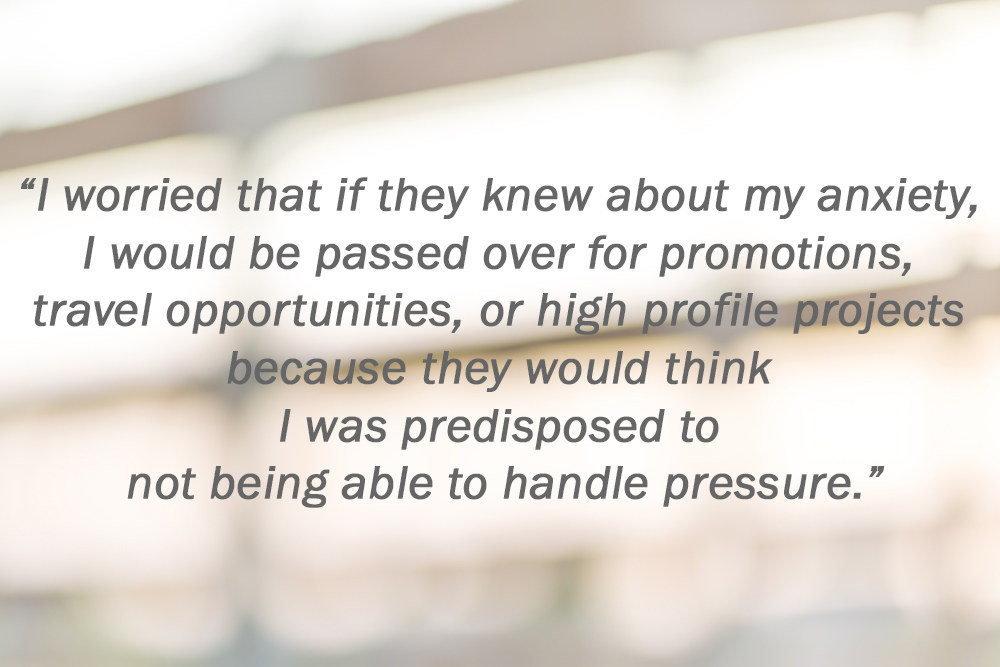
I have suffered from anxiety for most of my adult life, and after a particularly difficult time a few years ago, I decided to seek help from a therapist.
This meant having weekly hour-long appointments, but I was terrified to tell my colleagues where I was going. I was working in a very competitive environment and we were often required to do high-pressured work.
I worried that if they knew about my anxiety, I would be passed over for promotions, travel opportunities, or high-profile projects because they would think I was predisposed to not being able to handle pressure. As it happens, focusing on work is one of the ways I manage my anxiety more successfully, but I didn't think they would understand and couldn't face the potential struggle of trying to make them understand.
In the end I didn't reveal my anxiety at work and I regret doing that as I only made things harder for myself and caused unnecessary stress. To make it to therapy I would invent dentist appointments if I couldn't get an out-of-hours session, which if you think about it, looks far more unprofessional than I thought mental health issues would. Nobody's teeth are that bad. – Anonymous
5.
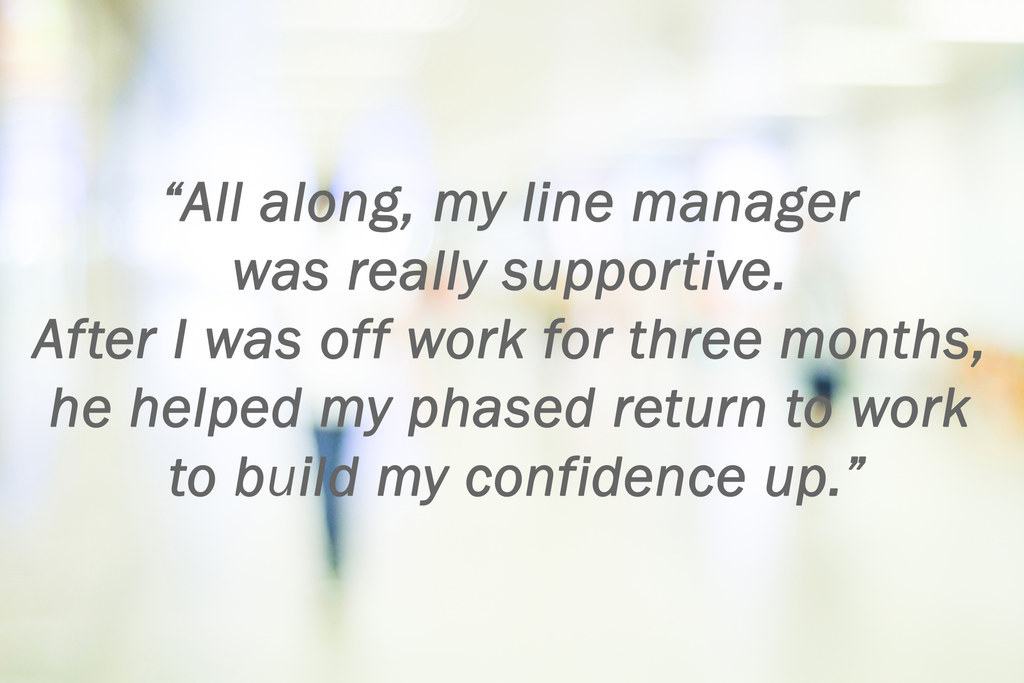
I was ill with episodes of depression between 2005 and 2009. I had no energy, felt a loss of enjoyment, and was unable to concentrate. I felt guilty and bewildered about feeling so awful and had suicidal thoughts.
I had therapy arranged through the employee assistance programme, but I kept falling ill again after six to nine months. In 2008 I had my worst bout. I was so tired physically I couldn't get out of bed for two months.
All along, my line manager was really supportive. After I was off work for three months, he helped my phased return to work to build my confidence up.
I have been well since 2009, which is down to a combination of things, including antidepressants, exercise, and therapy.
Having a supportive environment at work is very important. In 2012, I helped set up a mental health network at the Bank of England.
We have arranged very powerful and insightful events where staff have spoken openly about their mental health problems. They talked about their ill health, but also highlighted how they got better and were successful at work with the Bank's support. – Adam Spreadbury, co-chair of the Bank of England's Mental Health Network
